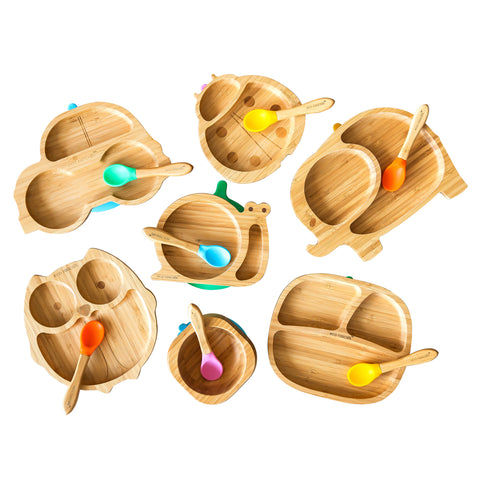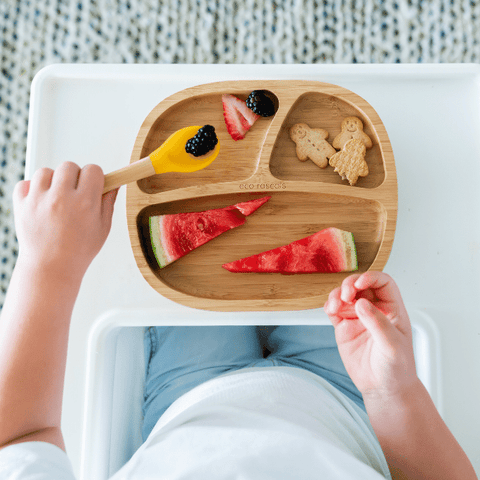It’s been said that a determined mother can conduct better research than a government agency when she sets her mind to it. And when it comes to the health and safety of their children, mums leave no stone unturned.
Perhaps you've stumbled across our article whilst researching the recent news from the Netherlands about the dangers of bamboo tableware which contains Melamine - such as coffee cups and colourful kids tableware concepts.
We wanted to take this opportunity to tell you why
When questions arise as to the safety of the daily products that you use to feed and nurture your children (products that you may have used for years), it can feel a little unsettling.
Why then are so many smart parents replacing their old tableware with bamboo dinnerware for their children? What do they know that you don’t?
Let’s take a closer look.
Why Choose 100% Natural Bamboo Dinnerware?
If you think that bamboo dinnerware is just a choice made by alternative families living off the grid in a rural village, then we have some fascinating information for you. We've noted some sound reasons why bamboo is becoming a preferred dinnerware product for health-conscious parents.
Let’s Talk Safety
More parents are becoming aware of the risks associated with the use of plastics, and the chemicals that subsequently leach into their family’s food.
But is this really an issue? Or is it just another conspiracy theory to push you into buying products that you wouldn’t have previously considered? What does science say?
Let's see.
Bisphenol A (BPA)
BPA is used as a hardener for plastics and can be found in hard plastic baby bottles and other eating and drinking containers, including the lining of some baby formula brands.
Toxicologists are concerned about the risks associated with rising levels of BPA in humans. Some studies have shown an increased risk of chromosomal defects in unborn children, miscarriage, and increased levels of testosterone in both men and women.
There is still controversy between the chemical and the health industry regarding the extent that BPA affects the human body. However, way back in 2010, the USFDA recommended decreasing exposure to BPA while they explore these concerns further. Canada, however, chose to ban the use of BPA in baby bottles that same year.
Other medical sources cite references to studies that link BPA to fertility problems, heart disease, hypertension, and insulin resistance, amongst others.
Bisphenol S (BPS)
BPS is a close relative to BPA and has been used recently in plastic products to replace BPA. This allows the manufacturer to cater to popular trends and label their item BPA-free.
However, this chemical replacement has proven to be more potent and fast-acting than its counterpart and is recommended for an immediate ban.
These are just two of the many chemical additives found in plastics in which our foods are packaged, stored, and served. The list of medical concerns associated with these is even longer, including risks of cancer, negative effects on the immune system, and asthma.
As parents, we may have always chosen plastic plates and cutlery for our little ones as a practical solution. They’re bright and colourful, easy to clean, and can take a beating.
Perhaps, though, we need to rethink this.
Melamine
Melamine is an organic compound made primarily of synthetic polymers, including formaldehyde. Melamine has been used to make dinnerware and other household products for decades now as it's easy to shape and mould via heat and pressure for numerous products.
Melamine was previously deemed safe, but more research has shown that when Melamine is heated in the microwave, or when hot food and drink comes into contact with Melamine products, it can release toxins which in turns contaminate your food which you ingest into your body.
Food safety institute NVWA in the Netherlands has put an immediate ban on the sale of melamine and bamboo fibre crockery because it contains too much formaldehyde. The combination of bamboo and melamine, a synthetic resin, produces formaldehyde which can cause ulcers or other types of stomach complaints.
Thus rendering 'bamboo fibre' crockery as toxic and unsafe for use for children.
The Benefits of Natural Bamboo
There's no doubt that today's consumer is becoming increasingly aware of the long list of positives that comes with natural products. The demand for chemical-free shampoos and home cleaning products is on the rise, along with a shift away from processed foods and drinks for children.
So, why use natural bamboo dinnerware instead?
Healthy
When you choose to invest in good quality bamboo dinnerware - and by good quality, we mean 100% natural bamboo. Not the tableware that brands itself as natural bamboo but is actually mixed with melamine and other nasties, you can be sure that you are offering your children a safe and non-toxic option.
As a naturally occurring and renewable product, they don’t require the same harmful chemical additives that plastic products do during manufacture. Therefore, there is no chance of inadvertently exposing our children to an unpronounceable chemical, leading to health complications.
Bamboo is also naturally an anti-microbial and anti-bacterial material.
Practical
Bamboo dinnerware is easy to clean by hand, stain-resistant, and odour resistant. A simple wipe-down in warm soapy water is all you need to keep your dinnerware hygienic.
If you’re looking for sturdy bowls for your little one, then you may want to consider one that can survive a tantrum, but probably won’t have to, given that it can stick firmly to the table or highchair.
Durable
Did you know that bamboo is three times stronger than wood and enjoys a higher tensile strength than steel? No wonder it’s used so extensively in the building industry! It’s clear that when crafted into beautiful dinnerware for children, the durability of bamboo is clear and will stand up to the focused abuse of an angry toddler.
Bamboo is also an incredibly lightweight option that won’t damage your kitchen tiles if it lands on the floor.
Quality bamboo plates and cutlery will give you years of service when properly cared for. And once their usefulness comes to an end, you can rest assured that they will gently break down in nature without adding any stress to our beleaguered planet.
Stylish Bamboo Dinnerware for Kids
With the important health facts clearly noted, we’d like to highlight another benefit which is not a ‘need’ but is certainly a ‘want’.
Bamboo dinnerware is simply beautiful. With its light wood grain and softly rounded edges, it delivers a classic style to your home, even as ‘kiddieware’.
Make a Wise Decision
Researching the pros and cons of bamboo dinnerware for your children places you firmly in the realm of wise parents who care. Indeed, healthy, eco-friendly choices can be tough to make in this world where half-truths and big business are a constant distraction from what’s best for your family.
Making use of an organic, recyclable, and biodegradable product minus pesticides and chemicals is a responsible decision.
We'd love to introduce you to our amazing range of tableware and answer any questions you may have about this versatile product.





Comments (0)
There are no comments for this article. Be the first one to leave a message!